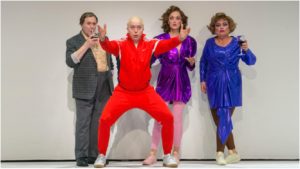
New Wave Festival 2018-19 Review: Greek
By Xenia HanusiakWhen British composer Mark-Anthony Turnage wrote his two act opera “Greek” he was 26-years-old. The opera that premiered in 1988 in Munich, care of a co-production of the Munich Biennale, Edinburgh International Festival and the BBC, launched Turnage’s career.
He has not looked back since.
Post “Greek,” most audiences recognize Turnage via his two most popular works – the opera “Anna Nicole,” based on the life of model and actress Anna Nicole Smith, and his garage band/orchestral work “Blood on the Floor.” Both compositions remain in constant repertoire in concert halls and opera companies across the globe and are hallmarks of Turnage’s stylistic signature. Turnage is interested in the juxtaposition of popular musicals styles – jazz and rock – with what we might call classical contemporary composition.
“Greek” paved his way.
US Premiere
So, with a new co-production by Scottish Opera and Opera Ventures with direction by Joe Hill-Gibbins, “Greek” returned for the Edinburgh Festival in 2017 and since has had a US premiere for the Next Wave Festival at the Brooklyn Academy of Music.
The dramatic spine of Turnage’s “Greek” is a collaborative adaptation (with Jonathan Moore) of Steven Berkhoff’s libretto based on his own 1980s verse-play “Greek” – a re-telling of Sophocles’ tragedy “Oedipus Rex.” Set in the Thatcher era, the opera can be called a period piece.
If you are familiar with the garish style of the eighties you are forgiven for not wanting to spend a night in the theater recalling those memories. After all, we are talking about mushy baked beans, shiny leotards and silly hair. I went to the theater with some trepidation. The cultural specificity of the work and its accompanying head banging industrial percussion signaled alarm bells.
But fear not – the opera that was a head turning moment for Turnage and for the opera canon at large proved it has not lost its zing. Further, the work reveals itself as an adept and stimulating musico-theatrical work that in 2018 does not feel like the exploratory makings of nascent composer, nor as a retro piece.
Sophocles’ tragedy was not exactly written for laughs. After all, this is the story of a man who kills his father and marries his mother, causing a plague that can only be stamped out when this poor man (Oedipus) exiles.
Irreverent Treatment
Hill-Gibbins gives “Greek” a raucous, brash and irreverent treatment that errs on the farce style of British playwright Joe Orton. If you are aware of Orton’s plays “Sloane” or “Loot,” you will instantly recognize the lashings of black comedy in use.
In this production, we find ourselves immediately in cahoots from the opening prologue. We are fully on board with Hill-Gibbins’s mockery of 1980’s British culture. While the design is minimal – the set is just a single pivoting white wall that rotates as a swinging door – everything else in the production is hyper-realized and hyper-characterized.
The cockney accents are garishly broad, the mushy baked beans are laced with maggots and the fashions are distastefully lurid. Hill-Gibbins’s staging relies on the fine cast of singing-actors, Alex Lowde’s fluorescent costumes, and Turnage’s energetic and colorful score.
Well-Served Overall
On all counts, Hill-Gibbins is served well. As the central character Eddy (Oedipus), Baritone Alex Otterburn managed to his infuse his shiny light baritone with a super cockney accent. “Eddy,” with his peroxided razor cut hairstyle and nylon red tracksuit, is both gawky and lovable. Otterburn is a natural character actor.
The rest of the cast – Susan Bullock, Allison Cook and Andrew Shore are character perfect in their multiples roles of mums, dads, wives, waitresses, sphinxes, and police. With quick costume changes and great physical finesse, the trio is super energetic.
The 20-piece musical ensemble – the soloists of Scottish Opera orchestra under the baton of Stuart Stratford are wonderfully complicit in the garage band aesthetics of the music. Part chorus, part industrial rock, and part orchestra, the entire ensemble is fully committed to the chanting and shield hitting that is asked from them.
Thirty years on we can easily appreciate why Turnage has earned his career. His score is a lesson in word setting, riveting color schemes, and thematic dramatic through-lines. Thanks to this minimalist staging, the unashamedly brash and ballsy performance style, “Greek” is allowed to shine. It is pleasing to be jolted with earthy energy.


